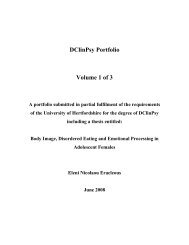PhD thesis - University of Hertfordshire Research Archive
PhD thesis - University of Hertfordshire Research Archive
PhD thesis - University of Hertfordshire Research Archive
Create successful ePaper yourself
Turn your PDF publications into a flip-book with our unique Google optimized e-Paper software.
The content <strong>of</strong> peer-reviewed publications are influenced by editorial<br />
restrictions and researchers‟ perceptions <strong>of</strong> the most important aspects <strong>of</strong><br />
their studies, and these factors might influence the analysis <strong>of</strong> data derived<br />
from published case-control studies. Nevertheless, the body <strong>of</strong> evidence<br />
available in the literature suggests that case-control studies <strong>of</strong><br />
Campylobacter infection are increasing in size and complexity without the<br />
corresponding improvement in our understanding <strong>of</strong> disease transmission. If<br />
anything, the move towards larger studies is perhaps magnifying the biases<br />
inherent in the methodology. Furthermore, they appear to be influenced<br />
heavily by investigator and reporter bias, as evidenced by the<br />
disproportionate pursuit <strong>of</strong> the poultry hypo<strong>thesis</strong>, which continues to explain<br />
only a fraction <strong>of</strong> cases.<br />
4.3 Case-case comparisons<br />
Case-case comparisons have been suggested as an alternative to case-<br />
control studies for studying the epidemiology <strong>of</strong> infectious diseases<br />
(McCarthy & Giesecke, 1999). These rely on comparing the exposures <strong>of</strong><br />
one set <strong>of</strong> cases with those from another similar, but suitably different, set <strong>of</strong><br />
cases. These studies have a number <strong>of</strong> advantages. Firstly, as the name<br />
suggests, there is no need to enrol healthy controls for comparison as the<br />
study consists wholly <strong>of</strong> cases. This means that studies are not only easier<br />
to conduct (control selection and recruitment is <strong>of</strong>ten problematic and labour-<br />
intensive) but there is also no need (in most instances) to obtain ethical<br />
approval if these studies are conducted within a primary surveillance<br />
framework. Indeed, this is a prerequisite in most instances, otherwise<br />
selection bias might occur. Second, case-case studies have the potential to<br />
use all (or most) <strong>of</strong> the cases within a study population, meaning that any<br />
findings relate to the entire study population. This does not usually occur in<br />
case-control studies, where only a small proportion <strong>of</strong> cases within a study<br />
population are used and the findings are (rightly or wrongly) extrapolated to<br />
the entire population. Thirdly, assuming suitable groups <strong>of</strong> cases are<br />
30

















